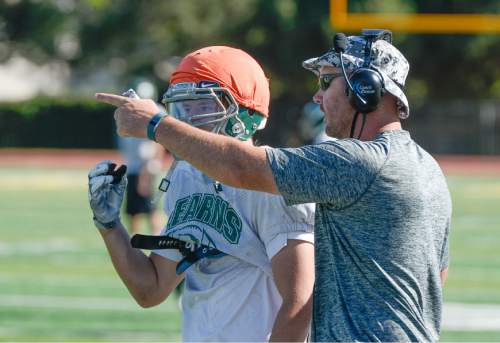This is an archived article that was published on sltrib.com in 2016, and information in the article may be outdated. It is provided only for personal research purposes and may not be reprinted.
The ruling on the field is, and long has been, that high school student-athletes in Utah ought not be allowed to jump from one school to another just to improve their chances of getting more playing time or to join, or build, a winning team.
But, pushed by a member who also serves on the board of a charter school that has had its run-ins with the state's athletic overlords, the Utah Board of Education is looking to overturn that call with one of its own. Its Friday agenda includes consideration of an edict that all public schools must abandon their membership in the Utah High School Activities Association unless that alliance ends its practice of reviewing transfers of athletes from one school to another.
Upon further review, it seems clear that the current system is workable enough and the existing rules should stand.
There just isn't enough evidence that overturning the existing practices would be a good idea. And there is much valid — if not downright livid — concern expressed by high school coaches and administrators that the proposed change would lead to a situation where a few powerful schools build athletic dynasties while other the programs fall into a spiral of decay.
It is true, as board Chairman David Crandall argues, that Utah has deliberately forgiving rules that allow families to choose which schools —public, private or charter — their children should attend, based on just about whatever criteria those families think are important.
And it is true that a family that elected to move a child to a new school in order to take advantage of a better music, science or vocational program would not be gaming the system but showing proper concern for their student's future.
Neither, though, is there any particular reason to fear that any public or charter school is sucking up all the chemistry talent, or recruiting all the best student computer programmers, leaving the other schools with the left-overs.
Sports is different. There is already too much of a tendency for the rich to get richer and the poor to get poorer as good quarterbacks or point guards tend to congregate at the already successful programs, year after year.
To throw away even the pretense that transfers are reviewed by the UHSAA to make sure they are reasonable choices based on educational needs, not a smaller version of college recruiting excesses, would be to make sports an even larger tail that already does too much to wag the scholastic dog.
This argument only exists, it seems obvious, because Crandall's Summit Academy, a Draper charter school, is upset about all the times it has been dinged by the UHSAA for alleged violations of its rules. So Crandall isn't just appealing the ruling of the referees, he's trying to get them removed from the field altogether.
If the state board wants to send its people to talk to the UHSAA's people about updating the rules and improving how they are interpreted and enforced, fine.
But Crandall's proposal has the smell of poor loser all over it. It should be dropped.



